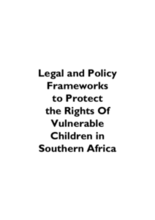As the impact of the HIV/AIDS epidemic continues to be experienced most severely in Southern Africa, 14% of children are now orphans and 48% of these children have been orphaned due to AIDS. These children are often uninformed about their rights and have difficulty accessing the support to which they are entitled, particularly if they do not have the support of a parent or caregiver. This report reviews legal and policy frameworks to protect the rights of vulnerable children, particularly those affected or infected by HIV/AIDS in 10 Southern African countries. The countries included are: Angola, Botswana, Lesotho, Malawi, Mozambique, Namibia, South Africa, Swaziland, Zambia and Zimbabwe. It aims to inform civil society organisations working to secure the rights of vulnerable children and to highlight gaps in policy development and implementation for policy-makers.
The research carried out by the review team at country level identified a number of areas where legal and policy frameworks are either inadequate or not enforced, creating widespread problems for children across the region. Key concerns and recommendations for vulnerable children include birth registration, inheritance, social security, child abuse, early marriage, moving across national borders, and education. Some issues raised are not discussed within this report as they are addressed by Save the Children in more depth in other documents. Children’s rights to health, including access to anti-retroviral treatment, is an emerging issue of importance and will be addressed by Save the Children separately.
Overall, progress has been made in the region towards supporting and sustaining national responses to enable children orphaned and made vulnerable by HIV and AIDS to realise their rights through the Rapid Assessment, Analysis, and Action Planning process led by UNICEF in 2005, which aimed to scale up and improve the quality of the response to orphans and vulnerable children at national level and to fulfill commitments made by national governments through the UN Declaration of Commitment on HIV/AIDS. Nevertheless, a more comprehensive process of legislative reform is required to ensure that vulnerable children’s rights are systematically addressed in national laws and policies and there is coherent consolidated children’s legislation. This process has been initiated in South Africa, Botswana and Lesotho, but in other countries it is either very slow or yet to begin.
Where there is adequate legislation and policy in place, there remains a clear gap between this and implementation on the ground. Greater attention needs to be paid to resolving the tensions between customary and formal laws as they relate to violence and ill-treatment of children and to ensuring that the need for new approaches is understood at community level to remove barriers which prevent children realising their rights. This includes addressing entrenched attitudes towards gender roles and treatment of women.
Many of the concerns raised highlight the need for allocation of resources and establishing structures and procedures to ensure that legislation can be enforced, including advocacy and awareness-raising on children’s rights and the provisions for their protection under the law, with public officials as well as with children’s caregivers and the community.
©Save the Children UK

